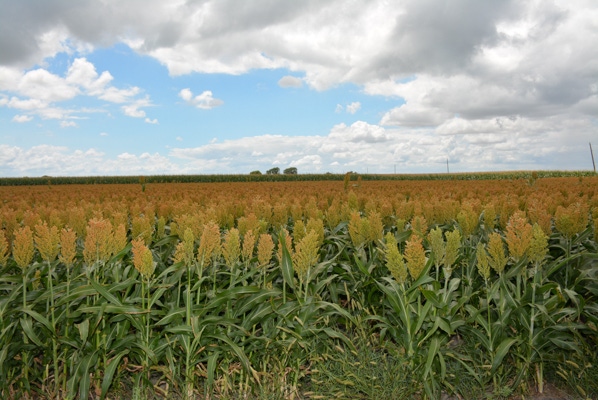May 30, 2019

Growers impacted by adverse weather during the 2019 planting season, along with looming crop-plant deadlines, may be looking for alternative crops to plant. National Sorghum Producers encourages growers to consider planting grain sorghum.
“Grain sorghum provides a number of benefits to growers as we enter a replant and late/prevent plant time period for the 2019 growing season,” says Dr. Brent Bean, Sorghum Checkoff agronomist. “There is typically a yield benefit for soybeans, cotton and corn when planted after sorghum. In addition, its root system is often able to penetrate compacted soils and can reduce diseases and nematodes that plague other crops.”
Grain sorghum can typically be planted later than other crops, and is often a lower risk option, specifically as it relates to seed costs, says Bean. For example, sorghum seed typically costs $9 to $18 per acre depending on seeding rate, while corn seed typically costs $55 to $110 an acre depending on seeding rate and traits. Harvest costs are often lower, as well.
DEMAND
Despite ongoing negotiations and tariff restrictions with China, the U.S. has sold multiple vessels of grain sorghum to China in the last month. NSP CEO Tim Lust said this demand and market signals offer optimism for global feed grain needs like sorghum.
See, Facebook Live with John Duff, National Sorghum Producers
“Despite trade uncertainty, demand for feed grain remains strong across the globe,” Lust says. “Furthermore, anticipated feed grain shortages from areas impacted by adverse planting weather will create significant localized demand for additional starch sources like sorghum. We continue to receive feedback from ethanol plants and other end-users about the need to fill gaps in supply this winter. Some have already posted sorghum bids, and others are strongly considering doing so.”
CONSIDERATIONS
Prior to selecting a replant crop, growers need to consider the USDA Market Facilitation Program (MFP) payment guidelines, which require producers to plant a program crop such as grain sorghum or alfalfa. Another consideration is final plant dates for crop insurance, which vary by region. Growers are encouraged to contact their insurance agent regarding coverage and options. Lust says sorghum also works well as a cover behind prevented planting, and resources on this provision are available from the USDA Risk Management Agency.
Additional agronomic and marketing resources, including information on Sorghum Management Following a Wet Winter and Spring, Pre-emergence Weed Control, Fertilizing Grain Sorghum, Seeding Rate, sorghum marketing connections, Sorghum Checkoff marketing staff, are available at SorghumCheckoff.com.
For information on local bids or additional information, producers can contact National Sorghum Producers at 800-658-9808.
You May Also Like




